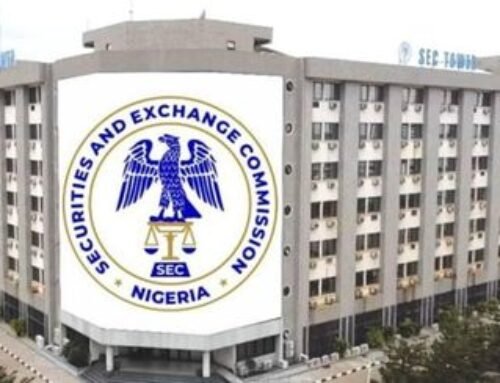
Abimbola Adeseyoju is Chief Executive Officer, DataPro Group, one of the indigenous credit rating agencies in the country. In this interview with Adedayo Adejobi, the financial expert who has garnered almost three decades in the industry speaks on the nation’s dwindling reserves, unimpressive GDP growth rate, prospects and challenges of credit ratings, among other sundry issues that plague the economy. Excerpts:
GDP growth of 5.01% in the second quarter of the year was the highest output growth since 2014. How sustainable is this feat, which beats the projected 2.5% GDP growth target of the government. What do you make of this and what to expect going forward?
First, I like to say the Nigerian economy is relatively resilient. But it is pertinent to put the 5% growth in context. Notably, the growth partly reflects the low base effect of the 2020 Q2 GDP numbers when the economy shrunk 6.1%. As you may observe, the nominal size of economic output in the second quarter of this year stood at N39.6trillion and that is still below the size of the economy in the first quarter when nominal GDP stood at N40.5trillion, and worse still it is far below the size of the economy in the second quarter of 2019, when Nigeria’s output was measured at N17.1trillion.
So, it’s good to be excited at this growth feat which marks the 3rd consecutive positive quarterly growth, hence reinforcing the recovery from recession, albeit it’s not eureka yet. Oil production is down to 1.2 million barrels per day from about 1.6millio barrels per day production we had in the second quarter, even as concerns are rising that prices may take a breather at current levels. Whilst oil sector represents less than 8% of the GDP, it may be a drag. Trade and manufacturing took positive turns in the second quarter but increasing foreign currency volatility, precisely at the parallel market may undermine the sustainability of that growth, given impact of relative scarcity of foreign currency for import. With the CBN and the fiscal authority providing support to agriculture, hopefully the sector remains resilient. Likewise, ICT should remain strong, as the telecommunications gear up for new investments in 5G technology, in expectation of NCC receipt of the spectrum and subsequent auction of 5G licenses.
While I am constructive in my expectation of sustaining the positive growth trajectory, I am conservative on the ability of the economy to sustain the strong 5% growth posted in the second quarter, given constraints on aggregate demand at all levels, as all the three economic agents are going through patches of income pressure – household income is not growing, thus undermine corporate earnings prospect and of course government revenue trails budget, hence undermining spending capacity, especially with the debt service burden, which represents 42% of 2021 budget but over three-quarter of actual revenue.
This is why we need revolutionary reforms across all major sectors, from oil & gas to agriculture, manufacturing to finance and indeed infrastructure. We need big push reforms and strong political will to catalyse deserving growth momentum that can change the narratives. While some aspects of the Petroleum Industry Act remain controversial, it is important to leverage this long-awaited legislation in opening up and revolutionising the sector, with the objective of ensuring increased domestic private sector participation and enhanced benefits to the country.
As the economy recovers, what impact will the positive trend in output have on the credit ratings of Nigerian corporates and the broader risk environment?
Recovery of the economy is generally rating positive but we would also continue to monitor the uneven recovery across sectors and sub-sectors to effectively integrate the impact of recovery or otherwise of each industry on the prospect of the corporates within the sector and implications for their credit ratings and broader credibility. Beyond the general expectation, the impact on companies are often uneven, as different companies have varying vulnerabilities and response rate to changing macros. Whilst some corporates have built relative resistance to macro volatilities, putting in place proactive measures to manage shocks and effectively exploit new opportunities, others are rather reactive. Hence, we do not use a single brush on all corporates, rather we drill down to the real fundamentals of each company, taking cognizance of the pros and cons of the macro events.
Considering possible lagged impact of the pandemic on corporate cashflows and credibility, what should be the focus of institutional investors holding or seeking to invest in debt instruments at this time?
Institutional investors need to focus on key fundamentals defining the sustainability of businesses. Major shifts in cashflows patterns are often times lagged effects of a few leading indicators, such as the strength of demand for the offerings of a corporate and its competitiveness, major changes in supply chains, cost profile, production margins and profitability. In addition, the quality of management, Corporate Governance, Regulatory Compliance, innovation and softer issues like ESG are increasingly important as early signals of business sustainability. All of these and many salient fundamentals of the operating environment are what credit ratings try to summarise. While a credit rating is neither an assurance nor investment report, it thus provides a foundation for counterparty assessment and investment analysis, being the output of a thorough independent assessment of the credibility of the entity or issuer of a debt instrument. So, investors and other users of credit rating reports should pay attention to the trend and details of credit ratings, which provides context to the rating.
What is the significance of credit ratings, especially as it seems to be a mandatory requirement for corporates seeking to raise funds, through commercial papers in the money market or bonds in the capital market?
Credit Rating is an opinion on the Creditworthiness of an obligor (entity (corporate) or issuer of a debt instrument). In other words, credit rating agencies worldwide assess the relative Credit Risk of Specific Debt Instruments or Structured Finance Instruments and Borrowing Entities. We serve as Information Intermediaries by reducing information cost, increasing the pool of potential borrowers and promoting liquidity in the capital market. Our function also increases the supply of availability of risk capital (venture capital) and ultimately promote economic growth. We therefore provide investors a base for making further analysis in taking decisions about investing in a security or taking risk on a counterparty, including lending to such counter-party. Credit rating helps to compare and benchmark different institutions and securities, despite varying fundamentals, as it provides a simple, objective basis for comparison, hence the reason why credit ratings are perhaps one of the most useful tools for pricing debt instruments.
As you rightly noted, it is a requirement for corporates seeking to borrow money from the public in the form of commercial papers through the money market or bonds through the capital market, as it provides a foundation for assessing the quality of the credit.
For instance, the Securities and Exchange Commission, our regulator prescribes a minimum rating construct for borrowers, hence borrowers whose credit rating falls below such rating are not allowed to borrow money form unsuspecting public, whose ability to effectively analysis the risk is limited.
This is an important regulation aimed at protecting the public from the tendency of unscrupulous entities to defraud the public. Similarly, pension fund managers only invest in instruments that are rated and can only place funds with institutions that have Investment Grade Rating(Min of BBB). This is essential to ensure the safety of pension funds, in the interest of pension contributors and in line with the regulation of the Pension Commission.
The Nigerian government had to get Fitch and S&P to assign Ratings on its Eurobonds to ensure the international investors buy into the securities both at primary market offering and also in the secondary market. However, FGN raises Bonds in the local market every month, without the instruments being rated. Why aren’t the FGN Bonds rated?
Yes, for Naira-denominated instruments issued by the Nigerian Government, they implicitly carry the highest credit rating possible, being “AAA”, as the full faith and credit of the Federal Government of Nigeria indicates the presumably “risk-free” premium on those instruments, as the Federal Government of Nigeria has full authority to print Naira as a way of repayment of the debt, in the extreme situation that it is not able to generate revenue to redeem the bonds. Whilst this should not be the case, as there are consequences for printing money, the fact that the Government is the issuer of Naira provides comfort on its ability to redeem all Naira obligations.
However, it is different for foreign currency denominated debts, as investors would need the Credit Rating as a basis of evaluating the capacity of the Federal Government of Nigeria to generate foreign currency revenues to redeem its obligations under such debt programme.
You recently released reports on the Rating reviews of Zenith Bank, United Capital, Total Nigeria Plc, Mixta Real Estate and DLM Capital. It’s noteworthy that you affirmed your erstwhile ratings on Zenith Bank and Total Nigeria Plc, now called Total Energies, assigning “AA-” and “A-“ ratings on Zenith Bank and Total respectively. What does this mean for the market?
Credit Rating is an independent thorough assessment of the credibility of an entity and its ability to meet obligations over a period of time, in our case, our Ratings are valid for a 12 (Twelve) Calendar month period, even so we monitor and change the Ratings either upward or downward, as may be required, during the Rating validity period. Each rating has its full meaning, and we ensure to define the meaning of this Rating constructs in our report. For instance, the “AA-” rating of Zenith Bank, which is two notches below the Sovereign rating of “AAA” indicates that Zenith Bank has a low risk, highlighting its strong financial strength, operating performance, governance, and capitalisation amongst other factors which suggest its ability to meet obligations as and when due over the next 12months validity period of the rating.
The rating of course reflects our independent and thorough assessment of the bank, with focus on local currency capacity over the next 12months. While it is neither a solicitation of business or investment for Zenith Bank, it is a summary review report that can guide different stakeholders in appraising the institution. Indeed, it is also a very useful self-assessment report for the management and board, as the rating exercise involves comprehensive engagement with management, and provides salient guidance on how to sustain and improve on the fundamentals of the bank.
There seems to be some judgements in Credit Ratings beyond the science. What are the key fundamentals that informs your assignment of credit ratings and how do you navigate the risks of subjective factors and conflicts of interest of analysts?
Credit Ratings are a blend of quantitative and qualitative metrics across different constructs, and it is important to state early in this conversation that the assessment is more forward-looking, even as we leverage on the historical performance in dimensioning the prospect of the business.
Thus, we look at issues ranging from financial performance, competitive positioning, management capacity, governance and regulatory compliance to issues bordering on the capital level and ability to generate both internal and external capital as may be required, operational excellence including risk management practices, and control systems that may expose the business to operational risks. So, whilst we have a robust framework that helps to objectively access various components of the risk elements and ensure its closeness to science as much as possible, there is a faint blend of judgement that may arise from the qualitative factors, albeit we moderate this judgement with the Rating process controls, including the fact that the Rating on any entity or instrument is the decision of a thorough review of the Rating Committee and not an individual analyst.
This is in addition to ensuring that we mitigate all probable conflict of interest, in line with the ethics and global standards of our profession. As pseudo umpires in the system, we adhere to the highest level of ethical standards, as we need to set benchmarks and lead the way on governance practices, hence we place the highest premium on our independence, integrity and ensure we prevent all forms of bias that may intervene in our work. Sometimes, clients feel we are paranoid set of people, but it’s a reflection of the high ethical standards we must adhere to.
Often times, you assign a different Rating on an Entity (Issuer) and a different Rating on its debt Instrument (Issue). Why is this so?
It is important to distinguish the difference in approach between credit rating on an entity (The Issuer) and credit rating on an entity’s instrument(Issue) as the analysis of credit rating on a debt instrument is purely based on the ability of the issuing entity to generate adequate cashflow and sustain relevant fundamentals critical to meeting all the obligations and covenants of the debt notes through till maturity, albeit the analysis that goes into an Entity Rating is much more broader, and considers overall credibility of the institution and ability to meet short and long term obligations, including its capacity to at least maintain the current fundamentals that define its going concern, market share, competitiveness and business sustainability, irrespective of current and emerging risks in the business and operating environment. For instance, if an entity issues a subordinated debt note, it means that the investors are ranked below all other types of creditors and are only senior to the equity owners, whose claim on the entity is residual.
This means that the investors carry an exceptionally higher risk, hence the Rating of such instrument will be lower than the Rating of the entity itself, the difference of which is a function of other covenants and factors. However, the Rating of an instrument (Issue) may be higher than the Rating of the entity(Issuer) if such instrument has features that gives the Investors/Holders of the instrument some preference over other creditors or if the instrument has a credit enhancement such as a Guarantee from an Investment Grade entity, which has a higher risk rating, for instance if the Sovereign or entities like InfraCredit and Impact Credit Guarantee of the Development Bank of Nigeria, which have “AAA” rating guarantees an instrument, the Rating of such instrument will be anchored on the Ratings of these guarantors and not the sponsor itself, especially when such guarantees are irrevocable and unconditional.
Credit Ratings seem to be an elite service, as I note that most smaller institutions, including Microfinance Banks, which also take deposits or other form of funds from Nigerian retail and institutional clients do not have Credit Ratings. Why is this so and what are rating agencies doing to change this narrative?
It is not an elite service, but I presume the low level of education, low enforcement and affordability of the small and medium scale enterprises have limited the penetration of Credit Ratings. At DataPro, we are working on a number of initiatives to deepen the Credit Rating market and make the service accessible to MSMEs, as it may help to catalyse enhanced governance and increased access to credit and broader capital for the MSME players. One of the initiatives is our upcoming virtual conference, which we are running in partnership with the Association of Issuing Houses of Nigeria, (AIHN) as we aim to further educate the market on the imperatives of Credit Rating for a post-covid economic recovery and how best to deepen our market and stimulate capital flows within the Nigerian economy.
Have you had cause to downgrade the ratings of institutions under your coverage and when such happens what is the expected reaction of the market?
Yes, we have many times downgraded the Ratings of some of the entities under our coverage for different reasons, including macro, industry and company-specific factors. When we have such Rating action on an entity, it often weakens the ability of the entity to raise capital, as it is a caveat for Investors to take caution on such entity, given that a Rating downgrade is an indication of deterioration in the fundamentals of the entity. This does not mean that the entity cannot meet obligation, rather it shows weakness in its ability. For instance a downgrade from “A-“Rating to “BBB+” does not mean investors cannot invest in the securities issued by the entity, as “BBB+” is still a good investment grade rating but it only signals weakness in the strength of the institution. Such Rating downgrade may mean that Investors should demand higher interest rate when lending to such entity, as against when it had a higher credit rating of “A-“.
How can the Nigerian economy function post-Covid?
It is becoming clearer by the day, that we may not be able to defeat Covid-19 permanently. Scientists are beginning to that we may as humans, finally have to live with it just like other diseases and viruses. So, we need to get out of the pandemic mood and face the future boldly. At least, we now have vaccines and improved management system. It’s now we turn our full attention to economic recovery and development.





